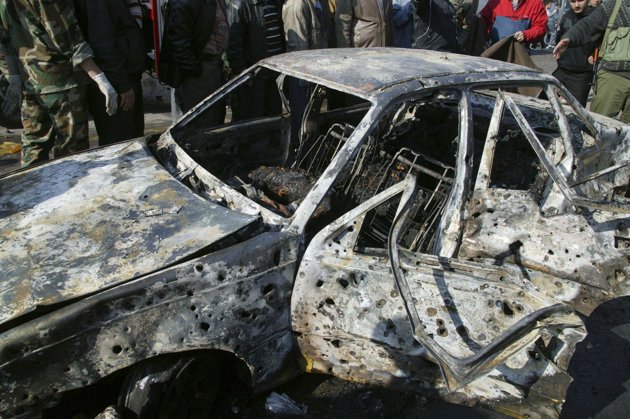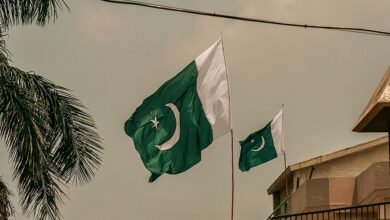
DAMASCUS — Twin suicide car bomb blasts ripped through an upscale Damascus district Friday, targeting heavily guarded intelligence buildings and killing at least 40 people, Syrian authorities said.
The blasts came a day after an advance team of Arab League observers arrived in the country to monitor Syria's promise to end its crackdown on protesters demanding the ouster of President Bashar al-Assad. Government officials took the observers to the scene of the explosions and said it backed their longtime claims that the turmoil is not a popular uprising but the work of terrorists.
The blasts were the first such suicide bombing in Syria since the uprising began in March.
"We said it from the beginning, this is terrorism. They are killing the army and civilians," Deputy Foreign Minister Faysal Mekdad told reporters outside the headquarters of the General Intelligence Agency, where bodies still littered the ground. State TV said initial investigations indicated possible involvement by the Al-Qaeda terror network.
Alongside him, the head of the observer advance team Sameer Seif al-Yazal said, "We are here to see the facts on the ground … What we are seeing today is regretful, the important thing is for things to calm down."
An opposition leader raised doubts over the authorities' version of the events, suggesting the regime was trying to make its case to the observers.
Omar Idilbi, a member of the Syrian National Council, an umbrella group of regime opponents, called the explosions "very mysterious because they happened in heavily guarded areas that are difficult to be penetrated by a car."
"The presence of the Arab League advance team of observers pushed the regime to give this story in order to scare the committee from moving around Syria," he said, though he stopped short of accusing the regime in the blasts. "The second message is an attempt to make the Arab League and international public opinion believe that Syria is being subjected to acts of terrorism by members of Al-Qaeda."
The blasts went off outside the main headquarters of the General Intelligence Agency and a branch of the military intelligence, two of the most powerful of Syria's multiple intelligence bodies. Outside the two buildings, mutilated and torn bodies lay amid rubble, twisted debris and burned cars in Damascus' upscale Kfar Sousa district. Bystanders and ambulance workers used blankets and stretchers to carry bloodstained bodies into vehicles. All the windows were shattered in the military intelligence building.
The two blasts went off within moments of each other in the morning Friday, a weekend day, echoing across the city.
"The explosions shook the house, it was frightful," said Nidal Hamidi, 34, a Syrian journalist who lives in Kfar Sousa. He said gunfire was heard immediately following the explosion and said apartment windows in a 200-meter radius from the explosions were shattered.
A military official told reporters that more than 40 people were killed and more than 100 wounded. He spoke to reporters on condition of anonymity in accordance with military rules. Earlier, state TV said the dead were mostly civilians but included military and security personnel.
The blasts came as the Syrian government escalated its crackdown ahead of the arrival Thursday of the Arab League observers. More than 200 were killed in two days this week.
The United Nations says more than 5000 people have been killed in the crackdown waged since March by the Syrian regime against protesters. With the arrival of Arab observers, the government has been eager to make its case, saying Thursday that 2000 of its security personnel and soldiers have been killed in the turmoil.
The regime has said the observer team will vindicate its claims that terrorists are behind the violence. Earlier this week, Foreign Minister Walid al-Muallem said it is in the interests of Syria for the observers to come and see what is really happening in the country.
Throughout the turmoil, Assad's regime has insisted the uprising is the work of terrorists and armed gangs backed by foreign powers trying to topple the state. It has also warned that the upheaval will throw the country into chaos, religious extremism and sectarian divisions. Assad and his inner circle belong to Syria's Alawite minority, and that community — a Shia offshoot — and minority Christians particularly fear reprisals from the Sunni majority.
Haifa Nashar, a 45-year-old Alawite living in Kfar Sousa, was shocked and wailing and she stood taking in the scene outside the building.
"I've never seen anything like this in my life, may God curse their souls!" she cried. She denounced Qatar, the Arab Gulf nation that has been at the forefront of criticism of Syria and pushed for Arab League sanctions against it.
"This is what Hamad wants," she said, referring to Qatar's prime minister. "There was never any difference between Syrians, Sunnis, Christians and Alawites. But if this is what they want, then I say Alawites before anyone else."




